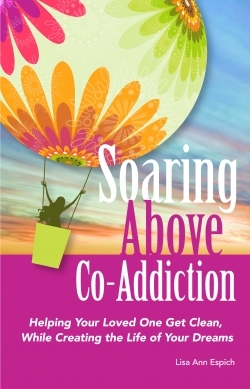Soaring Above Co-Addiction
Helping Your Loved One Get Clean, While Creating the Life of Your Dreams
For the first sixteen years of her marriage, Lisa Ann Espich served time in an invisible prison. She struggled with the behavior of her husband, Dean, who was addicted to alcohol, crack cocaine, and prescription pills. Although his addictions devastated her, for years she felt she couldn’t leave and constantly made excuses as to why she stayed in such a “co-addictive” relationship. She’d go after the holidays, she told herself, or as soon as their son started his next school year. Mainly, she just wanted Dean to get well, and worried that giving up on him would potentially result in his death or homelessness.
Finally, anchored in a solid profession as a corporate coach, she grew ready to leave Dean and save herself. In this combination of memoir and self-help guidebook, Espich writes, “It was when I learned to let go and focus on my own life that positive changes started to happen, and not only for me, but for my husband as well. The results were life-changing.”
By sharing her story and strategies, Espich hopes to help others who are facing similar battles, and prevent them from being stuck in the same type of holding pattern that she experienced. Guiding readers through the pain of co-addiction, Espich conveys the kind of straightforward advice, tough love, and support that’s necessary for anyone who’s working to change his or her situation. “Regardless of whether or not the addict in your life ever chooses recovery, you can start to live your own fuller and healthier life today,” she writes. Drawing on her expertise as a coach, she presents other case studies and common scenarios about what it’s like to live with an addict, and then follows those with strong guidance on taking control, finding inner strength, and reaching out for help.
The personal changes that Espich made might seem small–she began walking every evening for exercise, and started using affirmations and visualizations to create a more positive frame of mind—but they created an enormous shift in her thinking. By developing respect for herself, she opened the door for her husband to respect her as well, and finally he sought and received professional help.
The honesty that Espich displays will be invaluable to anyone facing the same type of anguish over a loved one’s addiction. Although her tactics, especially visualization, could prove useful, her work’s quiet strength lies mainly in providing evidence that someone can get free of a self-imposed prison of co-addiction, even after many years. She’s truly become the no-nonsense friend that she once wished she had, and those facing addiction issues would be wise to listen.
Reviewed by
Elizabeth Millard
Disclosure: This article is not an endorsement, but a review. The publisher of this book provided free copies of the book and paid a small fee to have their book reviewed by a professional reviewer. Foreword Reviews and Clarion Reviews make no guarantee that the publisher will receive a positive review. Foreword Magazine, Inc. is disclosing this in accordance with the Federal Trade Commission’s 16 CFR, Part 255.

